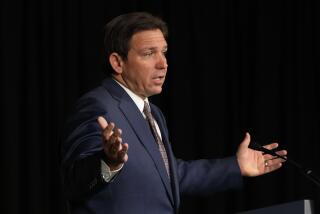In Key Races, Bush Had Little or No Impact : White House: An aide says GOP loss of the Texas governor’s race was ‘very hard on the President.’ Bush also stumped hard in Florida to no avail.
- Share via
WASHINGTON — For politicians, sometimes it is the personal losses that count most. Ann Richards, for example.
President Bush spent the last three days of the 1990 election season in Texas trying to defeat the woman who ridiculed him in 1988 as “poor George . . . born with a silver foot in his mouth.” He lost.
Bush also spent three days in Florida, stumping for the Republican candidate for governor, Bob Martinez, whose campaign chairman was Bush’s son, Jeb. He lost.
And at his summer home in Kennebunkport, Me., Bush held a fund-raiser to boost the local Republican congressional candidate, David Emery. He lost.
It could have been worse, of course. Bush, a former Republican Party chairman, spent weeks on the campaign trail over the last year helping his party’s nominees. And many won. Republicans held their losses in the House to a minimum and won several close Senate contests. Moreover, Republican candidates prevailed in several important gubernatorial contests.
But in most of the cases where GOP candidates won, even the White House was not claiming that Bush made the difference.
In many states, most notably California, candidates such as Sen. Pete Wilson welcomed Bush’s aid in raising money, but Administration officials conceded early on that Bush would have a minimal political impact on the outcome.
By contrast, Bush and his advisers had hoped the President could make a personal difference in a few states, particularly his adopted home of Texas.
Losing the Texas governor’s race was “very rough on the President,” said one aide as Bush sat with friends, watching election returns on television in the White House.
Not so long ago, the President, who got his political start in Texas, and his political advisers “were looking for a real break (all the way) down the ticket” in the Lone Star State, the aide said. White House strategists had hoped Bush’s personal popularity would help the party not only capture the Statehouse but also several other statewide offices and a couple of congressional seats currently held by Democrats.
The Republicans had hoped for a similar boost in Florida, one of Bush’s strongest states and the one in which Jeb, the only one of Bush’s sons to launch a political career, has major ambitions.
But in recent weeks, rising concern about the economy and declining faith in Bush’s leadership weakened the President’s ability to help his party’s nominees. In several states, in fact, Republican candidates privately told Bush to stay away, then embarrassed the White House by leaking that information to the press.
Tuesday night, Administration aides were taking some pleasure in noting that many of the Republicans who had shunned Bush did no better than the ones who had welcomed him.
In Illinois, for example, Republican Jim Edgar was trailing Democrat Neil F. Hartigan in their tight race for the Statehouse. Edgar had made a point this past weekend of asking Bush not to come to Illinois. And in Oregon, Republican Dave Frohnmayer, who had invited Bush to campaign for him early in the year but shunned the White House this fall, appeared to have lost his gubernatorial race to Democrat Barbara Roberts anyway.
But to round out a bad night for the White House, returns finally came in from Hawaii, where Bush had campaigned for Rep. Patricia Saiki to unseat Democratic Sen. Daniel K. Akaka. She lost.
More to Read
Get the L.A. Times Politics newsletter
Deeply reported insights into legislation, politics and policy from Sacramento, Washington and beyond. In your inbox twice per week.
You may occasionally receive promotional content from the Los Angeles Times.











